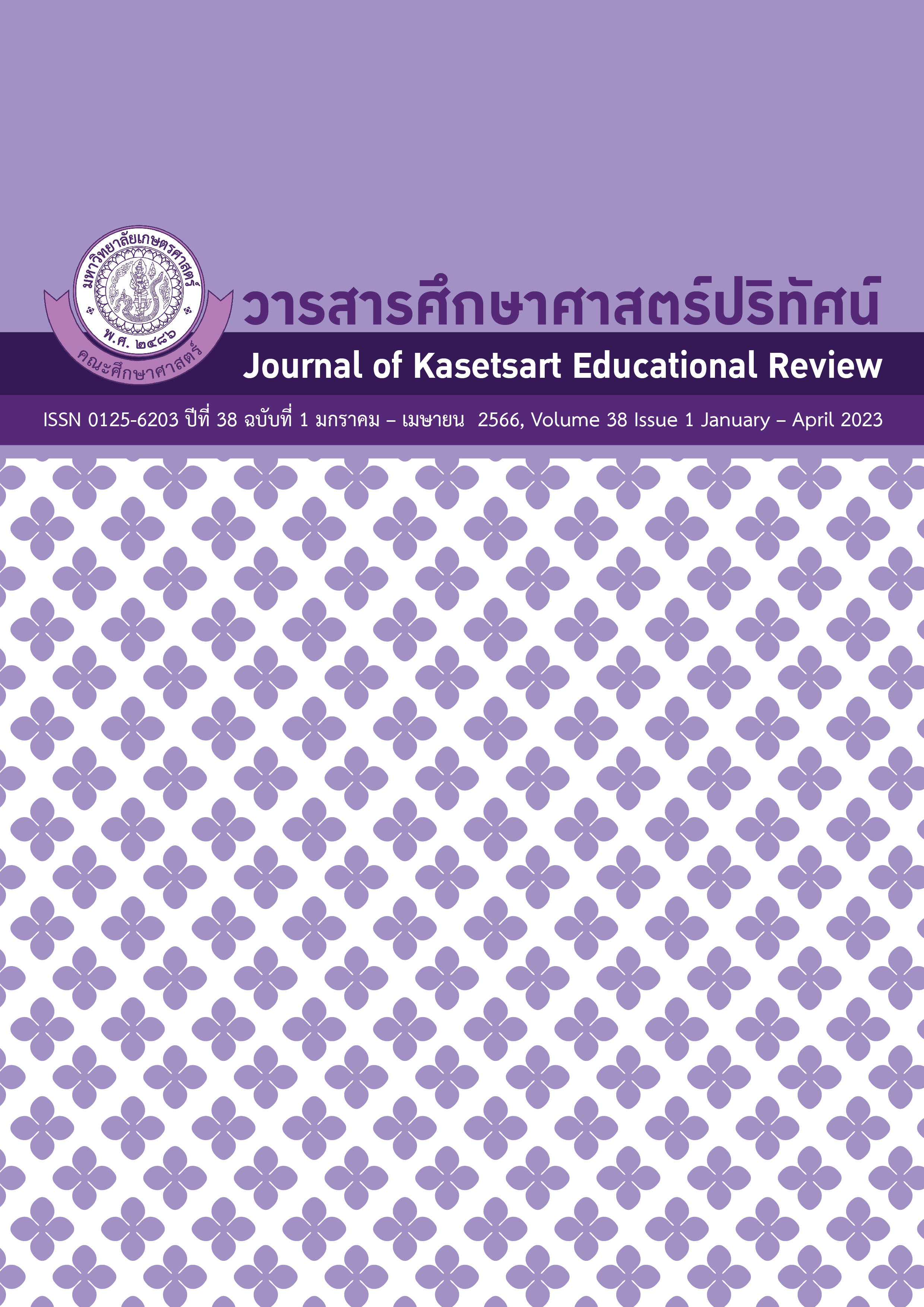ชุมชนแห่งการเรียนรู้ทางวิชาชีพ (PLC) กับการพัฒนาแผนการจัดการเรียนรู้ ฐานสมรรถนะตามแนวทางของ สสวท.
คำสำคัญ:
ชุมชนแห่งการเรียนรู้ทางวิชาชีพ, การจัดการเรียนรู้ฐานสมรรถนะตามแนวทางของ สสวท., การศึกษาชั้นเรียนบทคัดย่อ
การวิจัยนี้จัดทำขึ้นภายใต้โครงการเพิ่มศักยภาพครูคณิตศาสตร์ให้มีสมรรถนะครูยุคใหม่สำหรับการเรียนรู้ในศตวรรษที่ 21 โดยความร่วมมือของสถาบันส่งเสริมวิทยาศาสตร์และเทคโนโลยี (สสวท.) และมหาวิทยาลัยราชภัฏเทพสตรี มีเป้าหมายเพื่อพัฒนาแผนการจัดการเรียนรู้ฐานสมรรถนะตามแนวทางของ สสวท. ในบริบทของชุมชนแห่งการเรียนรู้
ทางวิชาชีพ (PLC) และการศึกษาชั้นเรียน โดยกำหนดวัตถุประสงค์การวิจัย ดังนี้ 1) เพื่อประเมินระดับคุณภาพของแผนการจัดการเรียนรู้ฐานสมรรถนะตามแนวทางของ สสวท. และ 2) เพื่อประเมินผลสำเร็จของการนำแผนการจัด
การเรียนรู้ฐานสมรรถนะตามแนวทางของ สสวท. ไปใช้จริงในโรงเรียน กลุ่มเป้าหมายคือ ครูผู้สมัครใจเข้าร่วมการพัฒนาแผนการจัดการเรียนรู้ฐานสมรรถนะโดยอาศัยกระบวนการ PLC จำนวน 7 คน เครื่องมือที่ใช้ในการเก็บรวบรวมข้อมูลเป็นแบบประเมิน 2 รายการที่ผู้วิจัยสร้างขึ้น โดยมีค่าความเที่ยงตรงเชิงเนื้อหา (IOC) อยู่ระหว่าง 0.80 - 1.00 ค่าดัชนีความสอดคล้องระหว่างผู้ประเมิน (RAI) อยู่ในระดับมาก (0.75)
ผลการวิจัยพบว่า 1) แผนการจัดการเรียนรู้ฐานสมรรถนะตามแนวทางของ สสวท. อยู่ในระดับดีมาก และ 2) ผลสำเร็จในการนำแผนการจัดการเรียนรู้ฐานสมรรถนะตามแนวทางของ สสวท. อยู่ในระดับมาก ( = 4.10) นอกจากนี้ กระบวนการ PLC และการศึกษาชั้นเรียน ทำให้ได้ข้อค้นพบใหม่ในการวิจัยครั้งนี้ คือ กลุ่มครูได้ข้อสรุปว่าการวิเคราะห์ทักษะกระบวนการทางคณิตศาสตร์ส่งผลให้ครูเลือกสมรรถนะได้ง่ายขึ้น
เอกสารอ้างอิง
Independent Committee for Education Reform. (2019). Thai Educational Reform Mission Report. Retrieved from http://www.backoffice.onec.go.th. (in Thai).
Inprasitha, M. (2014). Problem Solving Process in School Mathematics. Khon Kaen. Center for Research Mathematics Education. Faculty of Education. Khon Kaen University. (in Thai).
Meeporn, S. (2020). Professional Learning Community (PLC): A Way to Develop the Teacher Profession. Journal of Education, Mahasarakham University, 2(14), /27-28. Retrieved from http://www.edu.msu.ac.th (in Thai).
Office of Education Council. (2020). Competency base Active Learning. Cenjury. (in Thai).
Phuvipadawat, S. (2011). Principle of Teaching for Develop Student and Real-Word Assessment. 1sted. Bangkok: Duangkamon Publishing. (in Thai).
Srisaard, B. (2010). Preliminary Research. 8th ed. Bangkok: Suweeriyasarn. (in Thai).
Tachakup, P. and P. Yindeesuk. (2021). From Teachers Center’s Lesson Plan Strategy to Active Learning base on PLC. Retrieved from http://www.educathai.com . (in Thai).
The Institute for the Promotion of Teaching Science and Technology (IPST). (2020, March 4). Mathematical Literacy. Retrieved from http://www.pisathailand.ipst.ac.th. (in Thai).
The Institute for the Promotion of Teaching Science and Technology (IPST). (2020). The Project of the mathematics teacher potential development project to improve new-gen teacher’s competency for the 21st Century Learning. Arunprinting. (in Thai).
The Institute for the Promotion of Teaching Science and Technology (IPST). (2021). The Project of the mathematics teacher potential development project to improve new-gen teacher’s competency for the 21st Century Learning. Arunprinting. (in Thai).
Wongyai, W. and M. Phatphon. (2019). The Development of Learning Process Quality in the Context of Professional Learning Community: PLC. Bangkok. Innovative Leader Center. The Graduate School, Srinakharinwirot University. (in Thai).
Yamkasikorn, M. (2016). Professional Learning Community: Challenges in Self – Development of Teachers. Teachers Councils’ conference 2016 “Research and Learning Innovation and Education for sustainable development” (pp. 39-46). Bangkok: KHURUSAPHA All Rights Reserved. (in Thai).
ดาวน์โหลด
เผยแพร่แล้ว
ฉบับ
ประเภทบทความ
สัญญาอนุญาต
ลิขสิทธิ์ (c) 2023 วารสารศึกษาศาสตร์ปริทัศน์

อนุญาตภายใต้เงื่อนไข Creative Commons Attribution-NonCommercial-NoDerivatives 4.0 International License.
บทความทุกบทความเป็นลิขสิทธิ์ของวารสารคณะศึกษาศาสตร์ มหาวิทยาลัยเกษตรศาสตร์ วิทยาเขตบางเขน
วารสารศึกษาศาสตร์ปริทัศน์ (Kasetsart Educational Review)






